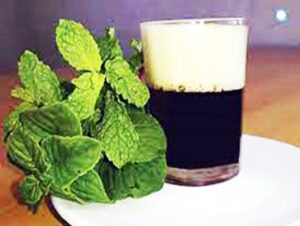
In recent times, I have been delving into the potency of attaya in the Gambia. This is partly due to the ingredient green tea which science has demonstrated its abilities on our health. Another area I found to share with you is our brain health.
Due to the numerous health benefits, we derived from green tea, I have been advising that we do away with the sugar we add to attaya. Attaya is akin to the Japanese version of their green tea called Matcha.
Attaya and Brain function, the Science
Drinking attaya improves brain function. For instance, Green tea does more than just keep you alert, it may also help boost brain function. The key active ingredient is caffeine, which is a known stimulant. Though green tea doesn’t contain as much as coffee, however, it has more to produce a response without causing the nervous effects associated with taking in too much caffeine.
How does it work on the brain?
Two studies answer this question: (Nehlig et al. 1992; Bertil B. 1995) assert that caffeine works on the brain by blocking an inhibitory neurotransmitter called adenosine. When this happens, it raises the neurons and the concentration of neurotransmitters like dopamine and norepinephrine.
Ruxton, (2008) also notes that caffeine may support diverse areas of brain function, including mood, vigilance, reaction time, and memory.
Nobre et al.(2008) emphasized that apart from caffeine that is known as a brain-boosting compound in green tea. The amino acid L-theanine is also found in green tea and this can even penetrate the blood-brain barrier.
How L-theanine also works was explained in three studies: Nobre et al. 2008; Nathan et al. 2006; Egashira et al. 2007) by increasing the activity of the inhibitory neurotransmitter GABA, which has anti-anxiety effects. It further raises dopamine and the production of alpha waves in the brain.
The combination of caffeine and L-theanine can have synergistic effects, and thus have a powerful effect in improving brain function (Kelly et al. 2008; Dodd et al. 2015). Due to the presence of Caffeine and L-theanine, green tea could make you have a milder and different kind of buzz than coffee. Several people have reported that drinking green gives them more stable energy and makes them more productive as compared to coffee.
Schmidt et al. (2014) study employed memory tasks and an advanced imaging technology called functional MRI to evaluate cognitive functions in healthy volunteers. They found that those given green tea extract performed better on memory tasks. They also observed enhanced connectivity between areas in the brain involved in the tasks.
This implies that the subjects show physiological changes in the brain that are linked with improved mental function.
A previous study, using an electroencephalogram to monitor brain activity, found improvement in brain wave activity after taking an EGCG (green tea extract) supplement(Scholey et al. 2012).
 The benefits extend beyond cognitive enhancement. For instance, in healthy adults, green tea also reduced psychological stress, including feelings of anxiety and depression, and led to a feeling of calmness (Hozawa et al. 2006; Scholey et al. 2012).
The benefits extend beyond cognitive enhancement. For instance, in healthy adults, green tea also reduced psychological stress, including feelings of anxiety and depression, and led to a feeling of calmness (Hozawa et al. 2006; Scholey et al. 2012).
Finally, another review study (Mancini et al. 2017) assesses the current state of knowledge in the literature regarding the effects of green tea or green tea extracts, l-theanine and epigallocatechin gallate both components of green tea on general neuropsychology, on the sub-category cognition and brain functions in humans.
The study found evidence that green tea influences psychopathological symptoms (e.g. reduction of anxiety), cognition (e.g. benefits in memory and attention), and brain function (e.g. activation of working memory seen in functional MRI). The effects of green tea cannot be attributed to a single constituent of the beverage. This is exemplified in the finding that beneficial green tea effects on cognition are observed under the combined influence of both caffeine and l-theanine, whereas separate administration of either substance was found to have a lesser impact.
Attaya, protect brain aging
Apart from improving brain function in the short term, it may also protect your brain as you age. For instance, Alzheimer’s disease and Parkinson’s disease, common neurodegenerative diseases in older adults could all be protected by drinking green tea.
For instance, Ma et al.(2016) conducted one of the largest studies, a pooled analysis of 52,503 participants in countries around the world, and found that tea significantly reduced the rate of multiple kinds of cognitive disorders by 35%.
Another large meta-analysis (Liu et al. 2017) examined the risk of cognitive disorders in 48,435 individuals. The study found that higher tea consumption was associated with a significant reduction in cognitive disorders.
They also found that green tea consumption was more reliably associated with cognitive benefits than oolong or black tea.
Two other studies(Feng et al. 2010; Kuriyama et al. 2006) report that there is a 36% reduction in cognitive disorders in habitual consumers of green tea as compared to non-habitual drinkers. Scientists also found a dose-response relationship: The more green tea consumed, the greater the protection from cognitive dysfunction. In practical terms, those who drank 16 ounces of green tea per day derived nearly six times more protection from the development of cognitive disorders than those who drank 3.5 ounces.
For instance, three studies, (Weinreb et al. 2004; Mandel et al. 2008; Caruana and Vassallo, 2015) demonstrate that the catechin compounds in green tea could decrease the risk of dementia by protecting neurons in test tubes and animal models.
For Parkinson’s disease, two case-control studies(Barranco Quintana et al. 2009; Hosseini et al. 2013) conducted in non-western populations found that tea consumption has a strong protective effect against Parkinson’s disease. About 41% were found in those who constantly drink tea more than those occasional drinkers.
A large meta-analysis(Qi et al. 2014) included 344,895 respondents globally and found that the amount of green tea drinking is associated with how one is protected from Parkinson’s disease. The study demonstrates that about 26% of those who take two cups daily had a reduced risk of Parkinson’s, especially in European and Asian populations.
Finally, Tomata et al.(2012) large, prospective study evaluated the impact that green tea can have on functional disability, regardless of the underlying cause. The study used about 14,000 Japanese respondents age 64. They reported that there is a good protective effect of greater green tea consumption, reducing the risk of disability and the need for support for daily activities.
This study also found that if we drink about five or more cups per day, we are likely to have 33% less functional impairment as compared to those who do not drink at all.
Take Home
Large Studies in humans have demonstrated the many benefits of drinking attaya (green tea) on our brains. For instance:
Ma et al. (2015) meta-analysis found that the rate of cognitive disorders was 35% lower in people who regularly drank tea.
Qi et al.(2015) also found that Parkinson’s disease risk was reduced by 26% for every two cups per day of tea consumed in another study. Green tea intake can reduce the risk of brain damage from strokes in multiple ways.
How much should we drink daily?
The studies reported drinking five or more cups of attaya (green tea) per day. I still reiterate the elimination of sugar in your drink. You can also buy green tea extracts in capsule form as they provide high quantities of polyphenols (catechins ).
NB:
Prof. Nyarkotey has strict sourcing guidelines and relies on peer-reviewed studies, academic research institutions, and medical associations to justify his write-ups. My articles are for educational purposes and do not serve as Medical advice for Treatment. I aim to educate the public about evidence-based scientific Naturopathic Therapies.
The writer is a Professor of Naturopathic Healthcare, a Medical Journalist, and a science writer. President, Nyarkotey University College of Holistic Medicine & Technology (NUCHMT)/African Naturopathic Foundation, Ashaiman, Ghana. Currently BL Candidate at the Gambia Law School, Banjul. E. mail: professor40naturopathy@gmail.com. + 2207452652(for more information)
References
- Schmidt A, Hammann F, Wolnerhanssen B, et al. Green tea extract enhances parieto-frontal connectivity during working memory processing. Psychopharmacology (Berl). 2014 Oct;231(19):3879-88.
- Scholey A, Downey LA, Ciorciari J, et al. Acute neurocognitive effects of epigallocatechin gallate (EGCG). Appetite. 2012 Apr;58(2):767-70.
- Hozawa A, Kuriyama S, Nakaya N, et al. Green tea consumption is associated with lower psychological distress in a general population: the Ohsaki Cohort 2006 Study. Am J Clin Nutr. 2009 Nov;90(5):1390-6.
- Feng L, Gwee X, Kua EH, et al. Cognitive function and tea consumption in community dwelling older Chinese in Singapore. J Nutr Health Aging. 2010 Jun;14(6):433-8.
- Kuriyama S, Hozawa A, Ohmori K, et al. Green tea consumption and cognitive function: a cross-sectional study from the Tsurugaya Project 1. Am J Clin Nutr. 2006 Feb;83(2):355-61.
- Liu X, Du X, Han G, et al. Association between tea consumption and risk of cognitive disorders: A dose-response meta-analysis of observational studies. Oncotarget. 2017 Jun 27;8(26):43306-21.
- Barranco Quintana JL, Allam MF, Del Castillo AS, et al. Parkinson’s disease and tea: a quantitative review. J Am Coll Nutr. 2009 Feb;28(1):1-6.
- Hosseini Tabatabaei N, Babakhani B, Hosseini Tabatabaei A, et al. Non-genetic factors associated with the risk of Parkinson’s disease in Iranian patients. Funct Neurol. 2013 Apr-May;28(2):107-13.
- Tanaka K, Miyake Y, Fukushima W, et al. Intake of Japanese and Chinese teas reduces risk of Parkinson’s disease. Parkinsonism Relat Disord. 2011 Jul;17(6):446-50.
- Tomata Y, Kakizaki M, Nakaya N, et al. Green tea consumption and the risk of incident functional disability in elderly Japanese: the Ohsaki Cohort 2006 Study. Am J Clin Nutr. 2012 Mar;95(3):732-9.
- Ma QP, Huang C, Cui QY, et al. Meta-Analysis of the Association between Tea Intake and the Risk of Cognitive Disorders. PLoS One. 2016;11(11):e0165861.
- Qi H, Li S. Dose-response meta-analysis on coffee, tea and caffeine consumption with risk of Parkinson’s disease. Geriatr Gerontol Int. 2014 Apr;14(2):430-9.
- Mancini E, Beglinger C, Drewe J, Zanchi D, Lang UE, Borgwardt S. Green tea effects on cognition, mood and human brain function: A systematic review. Phytomedicine. 2017 Oct 15;34:26-37. doi: 10.1016/j.phymed.2017.07.008. Epub 2017 Jul 27. PMID: 28899506.
- Mandel SA, Amit T, Weinreb O, Reznichenko L, Youdim MB. Simultaneous manipulation of multiple brain targets by green tea catechins: a potential neuroprotective strategy for Alzheimer and Parkinson diseases. CNS Neurosci Ther. 2008 Winter;14(4):352-65. doi: 10.1111/j.1755-5949.2008.00060.x. PMID: 19040558; PMCID: PMC6493995.
- Caruana M, Vassallo N. Tea Polyphenols in Parkinson’s Disease. Adv Exp Med Biol. 2015;863:117-37. doi: 10.1007/978-3-319-18365-7_6. PMID: 26092629.
- Weinreb O, Mandel S, Amit T, Youdim MB. Neurological mechanisms of green tea polyphenols in Alzheimer’s and Parkinson’s diseases. J Nutr Biochem. 2004 Sep;15(9):506-16. doi: 10.1016/j.jnutbio.2004.05.002. PMID: 15350981.
- Nehlig A, Daval JL, Debry G. Caffeine and the central nervous system: mechanisms of action, biochemical, metabolic and psychostimulant effects. Brain Res Brain Res Rev. 1992 May-Aug;17(2):139-70. doi: 10.1016/0165-0173(92)90012-b. PMID: 1356551.
- Bertil B. Fredholm(1995) Adenosine, Adenosine Receptors and the Actions of Caffeine. Pharmacology & Toxicology ://doi.org/10.1111/j.1600-0773.1995.tb00111.xCitations: 402
- H. S. Ruxton(2008) The impact of caffeine on mood, cognitive function, performance and hydration: a review of benefits and risks. Nutrition Bulletin. https://doi.org/10.1111/j.1467-3010.2007.00665.
- Anna C Nobre , Anling Rao and Gail N Owen(2008) L-theanine, a natural constituent in tea, and its effect on mental state. Asia Pac J Clin Nutr 2008;17 (S1):167-168
- Nathan PJ, Lu K, Gray M, Oliver C. The neuropharmacology of L-theanine(N-ethyl-L-glutamine): a possible neuroprotective and cognitive enhancing agent. J Herb Pharmacother. 2006;6(2):21-30. PMID: 17182482.
- Egashira N, Hayakawa K, Osajima M, Mishima K, Iwasaki K, Oishi R, Fujiwara M. Involvement of GABA(A) receptors in the neuroprotective effect of theanine on focal cerebral ischemia in mice. J Pharmacol Sci. 2007 Oct;105(2):211-4. doi: 10.1254/jphs.scz070901. Epub 2007 Oct 6. PMID: 17928735.
- Simon P. Kelly, Manuel Gomez-Ramirez, Jennifer L. Montesi, John J. Foxe, L-Theanine and Caffeine in Combination Affect Human Cognition as Evidenced by Oscillatory alpha-Band Activity and Attention Task Performance, The Journal of Nutrition, Volume 138, Issue 8, August 2008, Pages 1572S–1577S, https://doi.org/10.1093/jn/138.8.1572S
- Dodd FL, Kennedy DO, Riby LM, Haskell-Ramsay CF. A double-blind, placebo-controlled study evaluating the effects of caffeine and L-theanine both alone and in combination on cerebral blood flow, cognition and mood. Psychopharmacology (Berl). 2015 Jul;232(14):2563-76. doi: 10.1007/s00213-015-3895-0. Epub 2015 Mar 13. PMID: 25761837; PMCID: PMC4480845.









